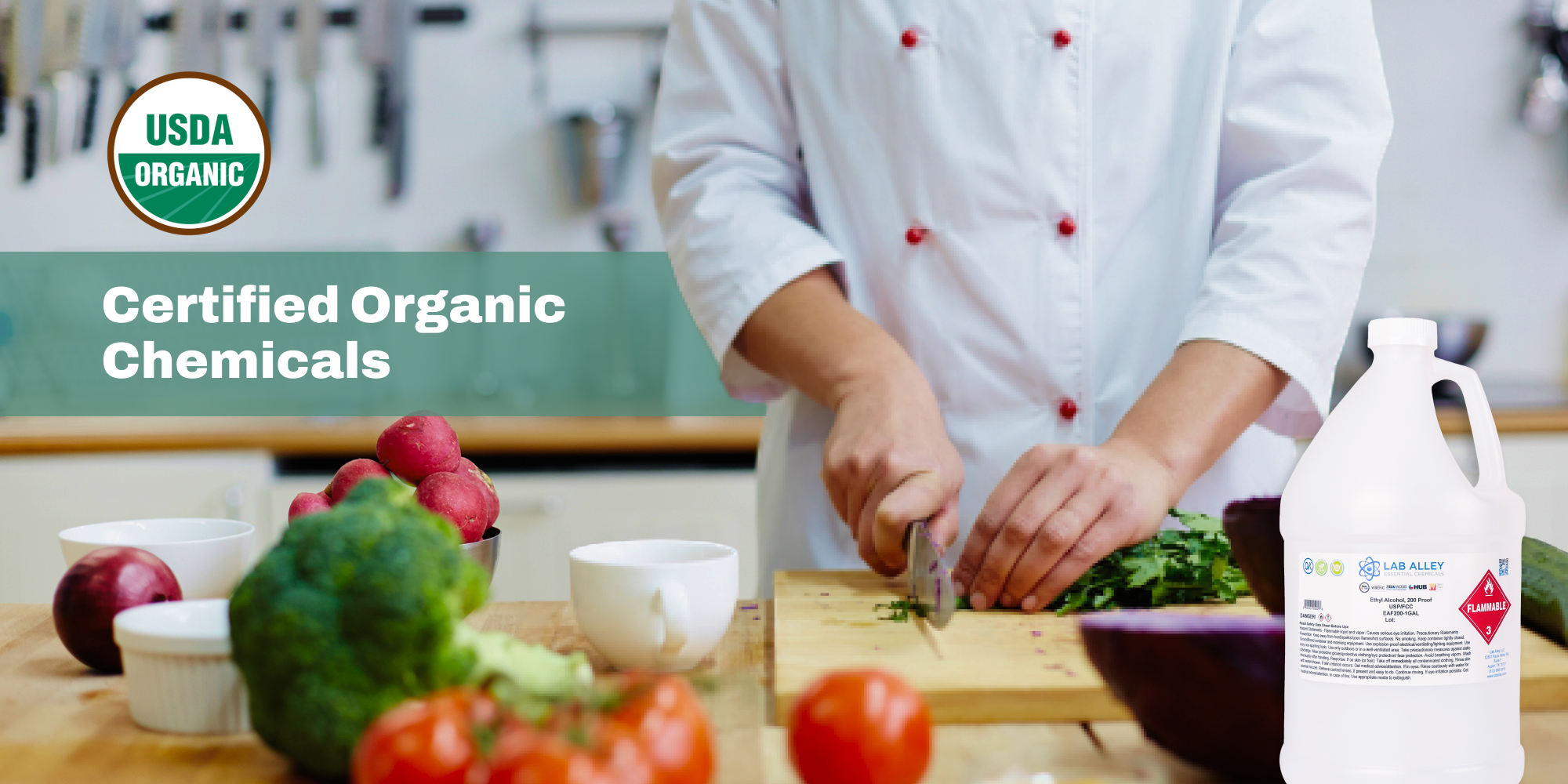Organic Certification

Organic Certification of Chemicals in the Food and Beverage Industry
The Certified Organic label is perhaps one of the most trusted labels in the food and beverage industry today. According to the National Organic Coalition (NOC), organic sales have totaled more than $60 billion and 82% of U.S. households buy organic food. Consumers look for Organic Certification as reassurance amid an increasingly opaque food system.
Business owners and product developers in the food and beverage industry must constantly stay abreast of consumer trends to compete with the growing options in the food market. As the food and beverage supply chain gets longer, consumers are increasingly drawn to reassuring labels. These labels help to give consumers confidence in the safety, quality, and environmental impact of food products.
Lab Alley always makes it a priority to anticipate the needs of our valued clientele. We make it our business to stay on top of market trends. That is why we have recently sought and received organic certification for a diverse portfolio of raw materials essential for various industries, including pharmaceuticals, botanicals, cosmetics, and food production. Lab Alley undergoes annual audits by Oregon Tilth, a USDA-accredited certifying agency renowned for its commitment to environmental protection and organic integrity.
In this article, we’ll break down the following topics for business owners in the food and beverage industry:
- What does organic mean?
- What does the organic certification process look like?
- What are the benefits of organic certification?
- Organic trends in the food and beverage industry
- What organic means for you
What Does Organic Mean?
In strict chemistry-speak, we use the word “organic” to refer to chemicals that contain carbons and hydrogens. In this context the opposite of organic is inorganic – a separate group of chemical compounds.
However, in a more typical colloquial as well as regulatory context, “organic” is adapted to describe specific agricultural practices that restrict the use of synthetic pesticides and fertilizers. In this scenario, the opposite of organic is non-organic. For example, you can buy organic produce or non-organic produce.
The National Organic Program (NOP) is in charge of setting the regulations for organic compliance. The NOP is a subset of the United States Food and Drug Administration (USDA).
Organic produce or plant-derived ingredients comply with certain growing restrictions, including the exclusion of non-organic pesticides and fungicides. Similarly, animal products can also be designated as organic or non-organic if they comply with certain livestock practices.
What is the Organic Certification Process?
You may have heard that many farms, especially small farms, follow organic practices but their products do not bear the official certified organic label. Why is that?
As it turns out, it is not enough to simply follow organic practices – because the USDA isn’t going to simply take your word for it. Organic certification requires inspection and approval by a USDA-accredited certifying agency.
If products meet the appropriate criteria, they may be certified as one of the following:
- “100% Organic,”
- “Organic,” or
- “Made with Organic (specified ingredients)”
The organic label requires that the product be made with at least 95% organic materials. It may contain up to 5% of conventionally grown materials or processing aids.
Organic chemicals are often perceived as having higher value since they are subject to more stringent requirements.
Organic Benefits
Food quality and safety, as well as environmental impact, are among the top concerns for consumers in the United States. Consumers rely on labels from trustworthy organizations to build their confidence in their food purchases.
In a capitalistic society where consumers vote with their dollar, consumers choose organic products because organic practices are believed to promote the conservation of natural resources and the protection of ecosystems.
As a supplier in the food and beverage industry, using organic chemicals can enhance not only the quality of your products, but the marketing appeal for consumers nationwide.
Organic Trends in the Food and Beverage Industry
Consumer mistrust in the food and agricultural industry has grown in recent years. In light of this increasing public concern, it’s no surprise that consumers increasingly rely on labels such as “Certified Organic” to reassure them about the quality and sustainability of their food choices.
What Organic Means for You
As consumers become more discerning about their food and beverage choices, the significance of organic certification grows. Here’s why investing in organic products is crucial for both you and the environment:
Enhanced Quality and Safety: Organic certification ensures products meet rigorous standards for quality and safety. By choosing organic chemicals, you’re aligning with practices that prioritize the health of both consumers and the environment.
Environmental Responsibility: Organic farming practices reduce the reliance on synthetic pesticides and fertilizers, promoting soil health and reducing pollution. This commitment to environmental stewardship is not only beneficial for the planet but also resonates with eco-conscious consumers.
Consumer Trust: With a growing number of consumers looking for trustworthy and transparent food choices, organic certification provides a mark of authenticity. It signals your products meet high standards, building trust and loyalty among your customer base.
Market Differentiation: Offering organic products can set your business apart in a crowded marketplace. As demand for organic options continues to rise, showcasing organic certification can enhance your product’s appeal and attract a broader audience.
At Lab Alley, we’re proud to be the leading chemical supplier in the food and beverage industry, and we hope our new offerings will continue to help you improve your products, level up your marketing, and excel as a business. Shop our certified organic product line hassle-free with easy order placement, transparent pricing, and fast delivery.

